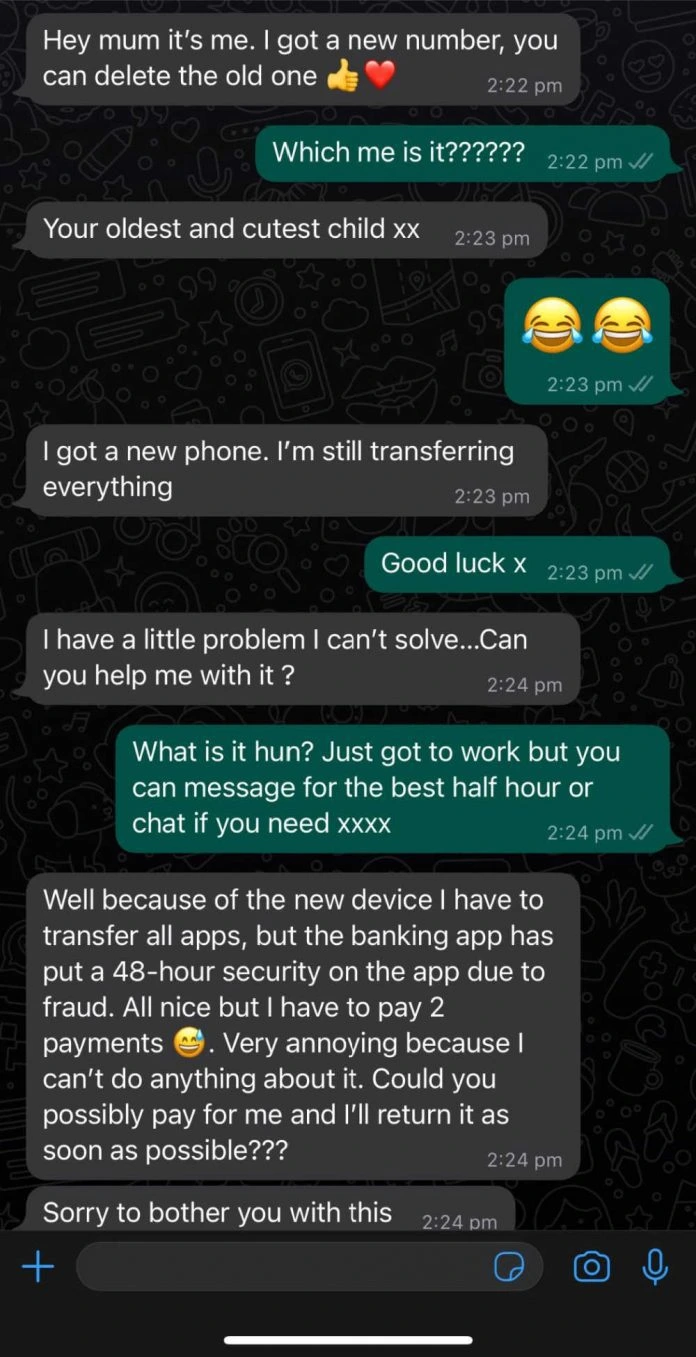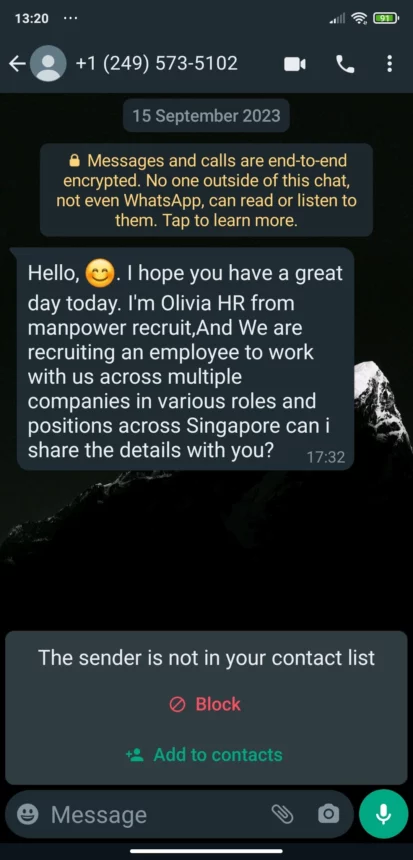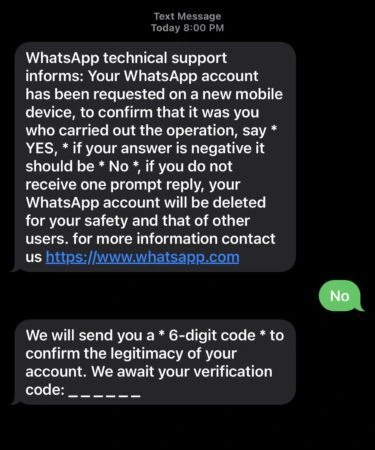With the tremendous expansion in digital communication, the popularity of platforms like WhatsApp has skyrocketed. However, this increased usage has also given rise to a worrying trend – WhatsApp scams.
These deceptive schemes aim to exploit unsuspecting users, compromising both their personal and financial security. This guide covers the hidden dangers that these scams pose and provide practical tips on how to protect yourself against such threats.
Let’s jump in!
Why learn about scams on WhatsApp?
Now first things first — why should you bother learning about WhatsApp scams? Is it really that big of a deal? Well, the answer might surprise you.
So let’s say, out of the blue, you receive an urgent voice note on WhatsApp from a number you don’t recognize. The message is from someone you care about, claiming their phone was taken and they need cash immediately.
It might be your partner stranded without fuel, your child in college, or even your manager at work asking for an expedited wire transfer. In your haste to help, you promptly send the money, recognizing the voice on the other end.
The issue? The person you thought you were assisting isn’t who you think. It’s a scammer using sophisticated “deep-fake” voice technology to imitate someone you trust. This scenario represents just one type of scam on WhatsApp.
According to a recent report published by the FTC (Federal Trade Commission), US consumers lost more than $300 million to text scams in 2022. You can bet that many of them were perpetrated via WhatsApp, which just shows how lucrative these scams can be for the criminals behind them.
But why are WhatsApp users particularly vulnerable to these types of scams? Well, firstly, it’s worth noting that WhatsApp is the leading messaging app worldwide.
With over 2 billion active users globally, it’s not a surprise that scammers have turned WhatsApp into a digital hunting ground.
Is WhatsApp safe?
Given the statistics mentioned above, you might wonder whether WhatsApp is even safe to use at all. If scams on WhatsApp are so prevalent, then shouldn’t we avoid using it completely? Well, not necessarily—the answer mostly depends on the precautions you’re taking.
While WhatsApp has security measures in place, it’s not immune to scams due to the human factor. As long as there are individuals who are looking for easy ways to make money or exploit others, there will always be a risk of falling victim to such schemes.
Why do scammers use WhatsApp?
Before we go over the precautions, it’s important to understand why scammers specifically target WhatsApp users. Why are scammers on WhatsApp so prevalent when there are a lot of other messaging apps out there?
Well, one of the biggest reasons is the fact that WhatsApp is a free messaging platform that offers end-to-end encryption. While that’s good for user privacy, it also means that it makes it that much harder for authorities to track down scammers and bring them to justice.
Additionally, WhatsApp has a feature that allows users to easily change their phone numbers without losing their conversations or contacts. This makes it easier for scammers to create new accounts with different phone numbers if one of their schemes gets discovered.
Moreover, as we already mentioned, the popularity of WhatsApp means there’s a larger pool of potential victims. This means that a WhatsApp scam has a significantly higher success rate compared to similar scams on other platforms.
How do scammers use WhatsApp?
At this point, you might be wondering — how exactly do scammers use WhatsApp to deceive people?
Well, there are several ways they can go about it. One common tactic is creating fake accounts that impersonate someone you know or trust. They may even use stolen personal information to make their messages more convincing.
Another method is phishing scams where scammers send links or attachments claiming to be from an official source like a bank or government agency. These links can lead to fake websites designed to steal personal and financial information.
In the next section, we’ll go over some common WhatsApp scams, which should give you a clearer idea of how these tactics are used.
Common WhatsApp scams
Being aware of the common scams on WhatsApp can help you identify and avoid them. Here are some of the most prevalent ones:
- The fake family member scam: As mentioned earlier, scammers may impersonate someone you know and ask for money urgently. They may also claim to be in trouble or need help with a financial issue.

- The job offer scam: Scammers may use WhatsApp to offer fake job opportunities that require an upfront payment, personal information or a “follow” on social media.

- The WhatsApp verification code scam: Scammers may try to trick you into giving them the verification code sent by WhatsApp when setting up a new account. This allows them to take over your account and use it for malicious purposes.

- Call forwarding scam: Scammers will try to convince victims into enabling call forwarding on their WhatsApp account, allowing the scammer to intercept calls and messages meant for the victim.
- Fake blackmail scam: Scammers may send a message claiming to have compromising photos or videos of you and then demand money in exchange for not sharing them.
- Lottery, Gifts, or Surveys Scam: The scammer sends a message to the victim claiming they have won a lottery or a gift, but to claim it, they need to first complete a survey or share personal information.
- Vishing scam: Scammers use advanced voice technology to impersonate someone you know over a call or voice message on WhatsApp. Though not very common, this type of scam can be particularly convincing as it relies on “deep-fake” technology to deceive victims.
- Crypto Romance scam: Scammers pose as potential love interests on WhatsApp and attempt to convince victims into investing in cryptocurrency or other financial schemes.
- QR code scam: Scammers may send a message containing a QR code claiming it leads to a discount or special offer, but instead, it redirects to a malicious website designed to steal personal information.
How to protect yourself from WhatsApp scams?
As you can see, there are plenty of ways that scammers can use WhatsApp to deceive the unsuspecting. And this is just the tip of the iceberg. However, with the right precautions, you can significantly reduce your chances of falling victim to these scams.
For one thing, a good rule of thumb is to never engage with strangers who come to you with unsolicited messages and requests. This applies not only to WhatsApp, but any other messaging platform as well. Even if they claim to be someone you know, always verify their identity before sending any money or personal information.
In the case of potential vishing (especially when money is involved), always try to have a video call with the person before sending any money. You can also ask them questions to which only the real person would know the answer. These precautions will help you confirm their identity and avoid being scammed.
The following is an overview of other measures you can take to keep yourself safe on WhatsApp:
- Adjust Your Privacy Settings: By default, your privacy settings on WhatsApp are designed to be relatively relaxed, making a wealth of information about you available to other users. Adjust these settings to limit the visibility of your profile image, login times, read receipts, online status, and status updates. This will make it considerably more difficult for scammers to target you.
- Never Share Your Verification Codes: Verification codes are critical for accessing your WhatsApp account. Remain alert for unsolicited verification codes, and never share them with anyone, regardless of the circumstances.
- Report, Block, and Delete Suspicious Activity: If you encounter any suspicious messages or contacts, report, block, and delete them immediately. This will not only secure your account against the threat but will also alert WhatsApp’s security team to the potential scammer, thereby preventing them from scamming others.
How to know if your WhatsApp is hacked?
Now let’s say that despite your best efforts, you still end up being scammed and/or hacked. How do you know if your WhatsApp account has been compromised? Here are some signs to watch out for:
- You receive a notification that your WhatsApp number has been registered on another device.
- Your contacts start receiving strange messages from your number asking for money or personal information.
- Your profile picture and status have been changed without your knowledge.
- You can’t access your account, and when you try to log in, it says the number is not registered.
If you notice any of these signs, act quickly. Change your WhatsApp login credentials immediately and report the issue to WhatsApp’s support team. Also, inform your contacts that your account has been hacked so they can be cautious with any messages or requests from your number.
Keep in mind that scammers are always finding new ways to deceive people through WhatsApp. But by being aware of the common scams and taking precautions, you can significantly reduce your chances of falling victim to them.
FAQ
Is it safe to reply to an unknown number on WhatsApp?
No, it is not safe to reply to an unknown number on WhatsApp. If the number is not recognized or is not in your contacts list, we recommend blocking the number outright. Responding may expose you to potential scams or phishing attempts.
But let’s say that the content of the message seems legitimate—for example, if it’s something relating to your job or an event you’ve signed up for. In this case, do some due diligence before responding. Search the number online to see if there are any reports of it being linked to scams. If in doubt, err on the side of caution and try contacting the person using other means before responding.
How do you know that you have been hacked on WhatsApp?
If you notice any unusual activity such as messages being sent from your account that you did not write, or changes to your account settings that you didn’t make, then your account has most likely been hacked. Additionally, if you can’t access your account, or are constantly being logged out despite not doing so yourself, these are also signs of a potential hack.
